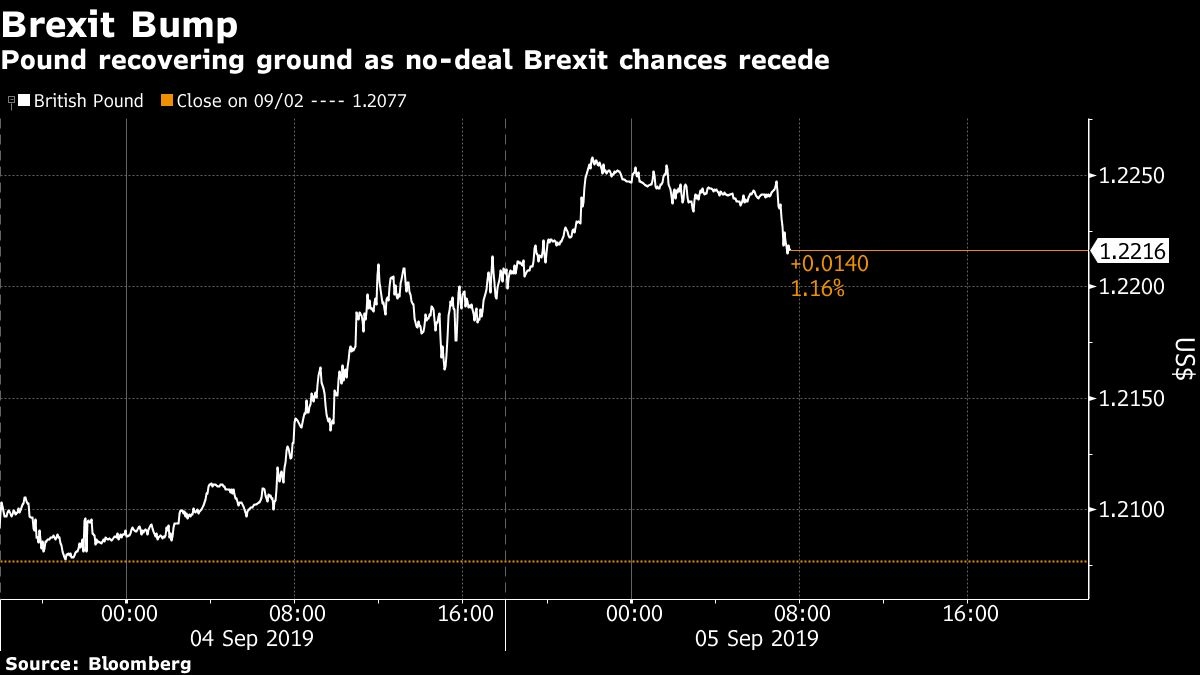Sep 5, 2019
Parliamentary 'twilight zone' confounds U.K. market strategists
, Bloomberg News
General Election Is Only Solution for Brexit, British-American Business Council CEO Says
U.K. Prime Minister Boris Johnson had a second bad day after Parliament moved to block the U.K. from leaving the European Union without a deal and later rejected his call for a general election.
For domestic U.K. stocks, that may support a more risk-on mood as the chance of the country crashing out of the European Union without a deal in place is diminished, according Mediolanum. The pound posted its biggest gain in six months on Wednesday, before giving back some of the gains Thursday. The internationally-focused FTSE 100 is little changed, underperforming the broader European gauge, with some large exporters declining on the pound’s strength. Some domestic stocks including U.K. grocery shares are outperforming.

Here’s what market participants had to say about last night’s developments.
Miton Group, Eric Moore
- “We seem to have entered some sort of Parliamentary Twilight Zone,” with suggestions that Johnson’s best way forward may be to call a no confidence vote in himself. “But it is interesting to see that despite these shenanigans the pound is up so far this week, perhaps reflecting the reduced risk of a hard exit.”
- Still, “extending Article 50 will cause the clouds of uncertainty over the U.K. to darken. All at a time when global economic activity is already slowing. This all suggests that investors should pursue a safety first approach.”
Mediolanum, David Holohan
- “The decision by MPs to block hard Brexit will further support ‘risk on’ sentiment for domestic U.K. equities while also supporting further gains for sterling against the euro and U.S. dollar.”
- “While the outcome limits the likelihood of a crash out scenario, it remains to be seen what deal can be supported by Parliament and the EU and this serves to limit sterling gains in the short term, until there is greater clarity on the route forward to achieving Brexit, albeit a soft exit from the EU.”
Scottish Investment Trust, Alasdair McKinnon
- Latest vote “raises the possibility that the Brexit deadline will be further delayed and worries about a no-deal Brexit can be kicked into the long grass as something to worry about another day.”
- “A number of European stocks have performed poorly in anticipation of the Brexit deadline and this vote gives investors some succor.”
London Capital Group, Ipek Ozkardeskaya
- “The latest developments don’t mean that the U.K. will leave the European Union with a suitable deal, it only means that the Brexit deadline will be delayed by at least another three months. Yet the tiniest hope of a Brexit deal is enough to lift the sentiment across the pound markets, provided that the net speculative short positions in sterling hit the highest levels since the first quarter of 2017.”
- “Hence, there is potential for a further short squeeze in this market, but the recovery should remain limited given that an extended Brexit deadline means a stretched period of uncertainty and the U.K.’s economic fundamentals are deteriorating.”
DeVere Group, Nigel Green
- “The squeeze on Boris Johnson’s plans will have a positive effect on the pound in the short term – we can expect it to trade considerably higher in the coming sessions as the potential for the PM losing his threat of no-deal increases. However, this might also be put in context. The rebound will be tempered by an imminent election.”
- “No one - but no one - is able to predict the frenetic intensifying political turmoil engulfing Brexit-weary Britain - there are too many variables and too many potential outcomes and consequences.”
Brewin Dolphin, Guy Foster
- “Not only does an immediate no-deal Brexit look less likely, the chances of getting a deal are increased. There will be more time to negotiate and the prospect of a parliamentary majority which increases the government’s tolerance of a no-deal outcome. An extension and a general election strengthen the chance of getting a deal.”
- “A return of implied volatility to normal levels would see the pound rally six cents against the dollar. Further gains beyond that depend upon the extent to which any resulting deal impacts growth potential.”







